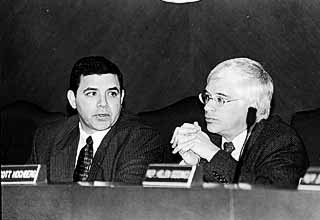Naked City
Learning Curve
By Kevin Fullerton, Fri., Dec. 15, 2000

Given the inevitable frustration that lies ahead for Texas legislators trying to stoke more performance out of the state's ailing education system, it's probably best that Monday's joint meeting between the state House Higher Education and Appropriations committees started off light.
"We don't have a shortage of students, we have a shortage of education ..." Appropriations Subcommittee Chair Henry Cuellar, D-Laredo, began to say to the packed room at the Capitol.
"And money," broke in Higher Education Committee Chair Irma Rangel, D-Kingsville, who isn't shy with her blunt assessments. "But I'm sure that we'll be able to find enough for all of us," she said, looking out over the row of university chancellors facing her. "I see some smiles out there," she added.
So the mood was cheerful, even though the reason for the meeting was grave: By every indicator available, including a recent report card from a high-profile nonprofit research group, Texas' public universities are falling behind other states in their completion and retention rates. According to a report released earlier this year by the Texas Higher Education Coordinating Board, the state's public universities are turning out fewer and fewer graduates relative to the state's population (see "Opening the Doors," p.36).
State leaders have known for some time that the Texas higher education pipeline has been running at low pressure compared to other states, but the myriad excuses have largely drowned out calls for substantive overhauls. More students in Texas are poor and from uneducated families, the chorus goes, so naturally, fewer are able to do college work.
But a report card from the National Center for Public Policy and Higher Education, the first state-by-state comparison measuring the degree to which higher education is made accessible, rebuts that claim. Uri Treisman, director of UT's Dana Center and an NCPPHE board member, told legislators that the report indicates that policy, not poverty, determines whether kids go to college. "Never look at it as a problem of the students you are trying to serve," said Treisman. "That is an irresponsible response ... In that way lies true danger for the state."
In its last two sessions, the state Legislature agreed to throw a billion new dollars into the budgets of state universities; but in those four years, Texas has seen virtually no gains in enrollment and graduation rates. On Monday, university leaders reported that not only had they failed to deliver the 16,000 new annual graduates promised in 1997, but Texas now needs to produce an additional 20,000 graduates to keep pace with other states.
Rep. Cuellar was visibly chafed by that news, and said after the hearing that the interim report prepared by his Appropriations Subcommittee on Education includes recommendations to more tightly define accountability measures for universities. Meeting prescribed goals for improved retention and graduation rates could become a prerequisite for increased funding, he says. "The old days of [universities] saying, 'Give us the money and we'll take care of business,' those days are gone," says Cuellar.
But higher education officials weren't the only ones to catch heat at Monday's hearing. As is well known to anyone familiar with efforts to improve education, blame for the shortcomings at the upper end of the system tends to tumble down to the lower levels. Rep. Scott Hochberg, D-Houston, closely questioned representatives from the Texas Education Agency about the TEA's decision to lower passing standards on the 2000 TAAS even as it increased the difficulty of public schools' curricula.
"Haven't you set a prescription to do the opposite of what you're asking teachers to do?" Hochberg asked, to which the TEA officials agreed, though assistant commissioner Ann Smisko explained that the reason was to protect students taking the exit-level TAAS from being unfairly affected by the tougher standards.
Treisman pointed out that Texas' public schools have made great gains at the elementary level, but added that policy now needs to be focused on getting more high schoolers into advanced courses. Legislators are promising action on that front this session, as well as on encouraging higher education to improve the quality and quantity of its teaching graduates.
"Next time, when this report card comes out [in 2002], I think we're going to do a lot better," Cuellar said at the hearing. It was hard to tell whether that was a wish or a threat.
Got something to say on the subject? Send a letter to the editor.








